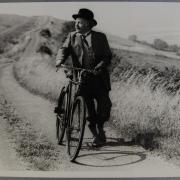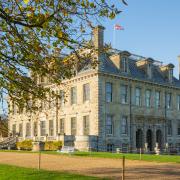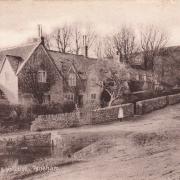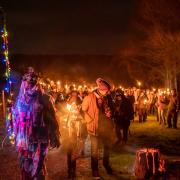The coming of Christmas was as much an occasion in 19th century Dorset as it is today. Carol singing is undoubtedly the most familiar festive celebration, though the old tradition of the singers going from door to door is less common.
In Hinton Martell in East Dorset, St Thomas Day, December 21st, was known as Gooding Day, and the children went round the village singing a song whose verses listed the ingredients needed for a Christmas pudding, which they then gradually accumulated. In Marnhull the children were joined by the elderly on a route round the larger houses saying 'Please, I've come a begging for Christmas'. In Sherborne the townsfolk went to the Digby Estate yard on Christmas Day in a tradition known as 'Up to Lodge'. There each was given 'two bright pennies' by the Wingfield Digbys, owners of Sherborne Castle and much of the town.
Thomas Hardy's account of the Mellstock musicians and choir setting out round the village with lit lanterns at midnight early in Under the Greenwood Tree, when somewhat the worse for wear on cider, manages to be both comical and moving. Puddletown, the Mellstock of Hardy, was one of the last Dorset villages to boast its own church band; composed of string and wind instruments, the players accompanied the congregation from the gallery in the west end of the church. In the novel, one player recalls carolling on a Christmas when 'Twas a hard frosty night, and the keys of all the clar'nets froze – ah, they did freeze! – so that 'twas like drawing a cork every time a key was opened.'
Each village had its own carols, drawn from a repertoire of several hundred, most of them now unfamiliar. In Under the Greenwood Tree, William Dewy lifts his violin to his shoulder outside Fancy Day's cottage and calls out a hymn number. The choir and band gather in a pool of light from the lanterns, 'Then passed forth into the quiet night an ancient and time-worn hymn, embodying a quaint Christianity in words orally transmitted from father to son through several generations down to the present characters, who sang them out right earnestly.' The tradition is continued at Bloxworth, where the church is always packed for the annual Dorset Carol Service of 19th century hymns, eight of them unique to the village and sung there for over 200 years.
Far less musical was the Shillingstone Christmas bull, made of wood and cloth, with 'shaggy head with horns complete, shaggy coat and eyes of glass, and wont to appear, uninvited at any Christmas festivity. None knew when he might or might not appear. The whole company would flee before his formidable horns, the more so as, towards the end of the evening, neither the Christmas Bull or his keeper could be certified as strictly sober.' Sobriety was equally scarce at the burning of the Yule log, known in the West Country as 'burning the ashen faggot'. A bundle of ash was bound together with a dozen lengths of ash, those present downing another glass each time a binding burnt through.
Cider also makes an appearance in Dorset's best known Christmas entertainment, the mumming play. William Barnes described them as a group of youths, 'decked with painted paper and tinsel', who went round the larger houses and inns in return for cider, a meal and money. Mumming plays were once common throughout the country. The basic plot was essentially the same with regional tweaks. The principal characters were Father Christmas, St George, a villain (a Turkish knight or Saracen), a comic doctor and collector. St George slaughtered the villain, who was then brought back to life by the doctor, after which the collector asked for contributions. In West Dorset, a hobby horse and additional characters were added. Some plays included a woman, played by a man, who as Father Christmas's wife was also killed then resurrected. The costumes varied. East Dorset favoured coats and trousers covered with strips of cloth. Further west white jackets and trousers were decorated with rosettes topped off with a hat shaped like a bishop's mitre and strewn with ribbons.
One characteristic common to all Dorset mumming plays was the amount that was drunk. The Chetnole mummers are reputed to have spent much of one night singing to a haystack which they mistook for a house. The First World War brought mumming to a close. Happily, one Dorset play still endures, that of Symondsbury near Bridport, keeping alive a tradition that may well go back 500 years:
'Here comes I, Father Christmas, welcome or welcome not,
I hope Old Father Christmas will never be forgot.
Although it is Old Father Christmas he has but a short time to stay;
I am come to show you pleasure and pastime before I go away.'



























